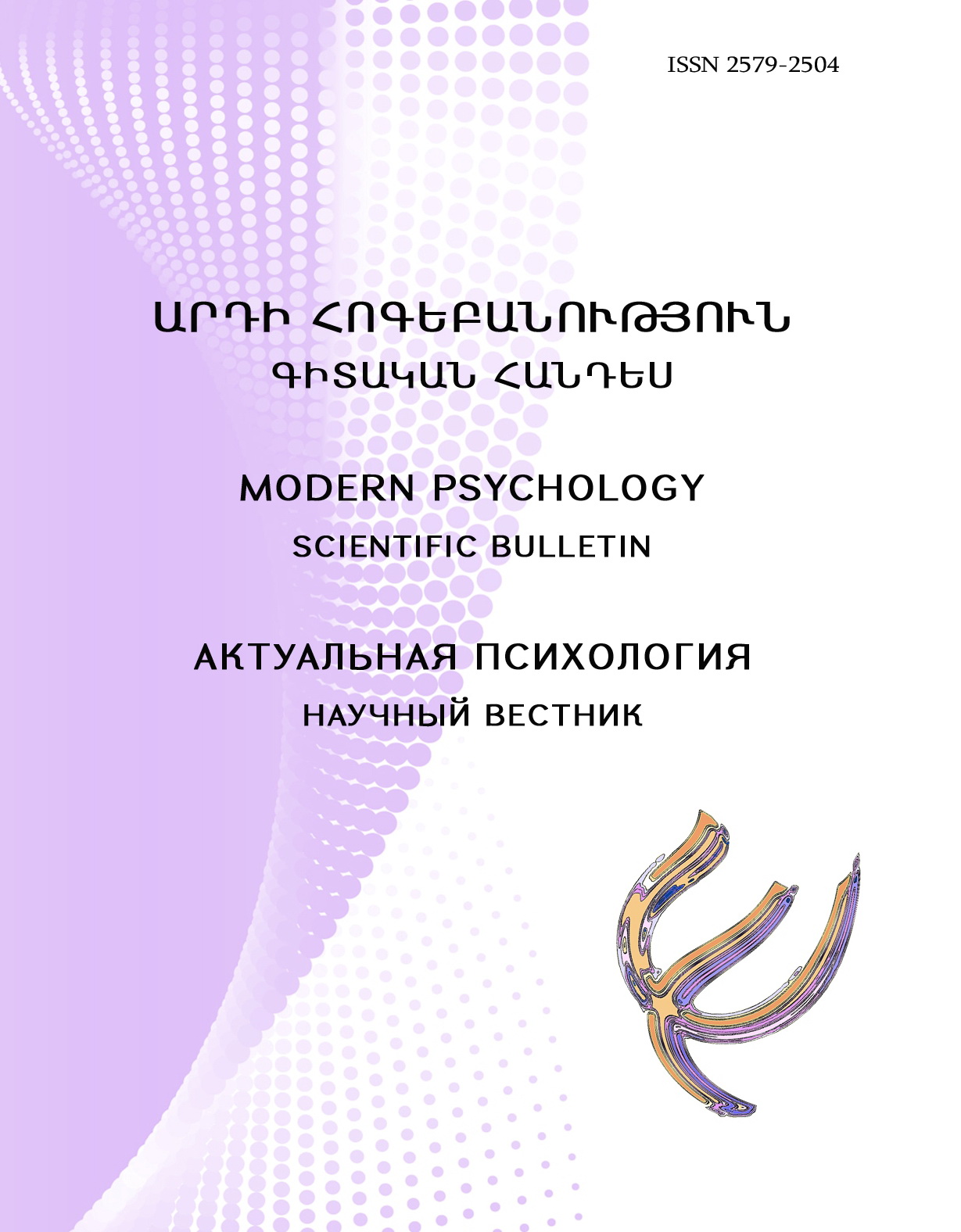CHARACTERISTICS OF THE COMPETENCIES OF THE PEDAGOGICAL STAFF IN THE CURRENT CRISIS SITUATION
DOI:
https://doi.org/10.46991/SBMP/2023.6.2.069Keywords:
professional competencies, pedagogical staff, crisis situation, psychological activation, emotional tone, stressAbstract
Recently, the changes taking place in RA due to the long-term crisis situation (war, covid-19 consequences) are challenging for professional abilities, among which we specifically referred to the professional competencies of pedagogical staff and their changes based on the effects of the crisis.
The paper presents the results of the study of the teaching staff competencies from the standpoint of mental activation, emotional tone and stress resistance parameters. Our goal is to show the manifestation of the above qualities as an additional resource in pedagogical activity, as well as the acquisition of new competencies. It is important to note that the modern conditions have been challenging for the professional competencies of pedagogical staff with the need to use technologies, as well as the changes that lie ahead came as a result of a number of effects caused by the crisis situation. Generally, the profession is made by competencies including the knowledge, skills and abilities and in crisis situation these components becoming the target. Pedagogical staff’s stress can be represented as the experience by a teacher of unpleasant emotions, such as tension, frustration, anxiety, anger, and depression, resulting from aspects of work as a teacher [9,11]. In recent years, steadily increasing costs and consequences of pedagogues’ stress has received growing concern. To reduce the negative effects stress has on pedagogues, more attention needs to be placed on these growing effects of the crisis [10]. Pedagogical stress is caused by environmental factors as well as individual characteristics. Major environmental factors include poor working conditions, scarcity of resources, heavy workloads, low level of ability to adapt to crisis situations, low level of openness to experience, emotional tone and etc.
References
Cipto Wardoyo, Yogi Dwi Satrio, Devi Aprlia Ratnasari, An analysis of teachers’ pedagogical and professional competencies in the 2013 curriculum with the 2017-2018 revision in accounting subject, REiD (Research and Evaluation in Education) 6(2), 2020, p. 142-149, https://doi.org/10.21831/reid.v6i2.35207
Guerrero, Dante, De los Rios, Ignacio, Professional competences: a classification of in-ternational models, Procedia – Social and Behavioral Sciences 46, 2012, p. 1291
Jefferey Sprenger, Stress and coping behaviors among primary school teachers, East Carolina university, 2011, p. 34-44
Kozlovskiy Y., Lievliev O., Mykytyuk O., Tiurina T., Dmytro Say, Features of formation of pedagogical competence of a university teacher in the leading countries of the world, Revista tempos e Espacos em Educacao, vol. 15, num 34, 2022, p. 16 https://doi.org/10.21831/reid.v6i2.35207
Linga T. Murthy, E-Education integrated teacher education and research, international journal of innovative research in advanced engineering, Issue 12, Volume 3, 2016, p. 24-28
Maksimovic J., Petrovic J., Osmanovic J., Professional competencies of future pedagogues, original scientific paper, 2015, p. 52-66, DOI: 10.17810/2015.05
Nick Panares, Ray Butch D. Mahinay, Mala Epra B. Magnaong, Classroom teachers’ 21st century skills in the K to 12 basic education curriculum implementations: Basis for policy review to increase NAT scores, ResearchGate, 2021, p. 1-10
Nessipbayeva O. The competencies of the modern teacher, Pre-service and In-service teacher training, 2012, p. 148-154
Papoyan V., Galstyan A., Sargsyan D., (2022). Transformation of Professional Psycho-social Competencies in Crisis Conditions: Bulletin of Yerevan University E: Philosophy, Psychology, 13(1 (37), p. 52–58. https://doi.org/10.46991/BYSU:E/2022.13.1.052
Papoyan V., Galstyan A., Sargsyan D., Karapetyan M., The role of the personality traits and motivation in manifestation in pedagogues' competencies, Bulletin of Yerevan University e: philosophy, psychology. vol. 14 N 1 (40) (2023), p. 55-63 https://doi.org/10.46991/BYSU: E /2023.14.1․055
Wan Hussin, 3-D stress management: Surveying the unexpected and mapping the ex-pected, 9th International Surveyors Congress, 2007, p. 34-44
21st century knowledge and skills in educator preparation, this paper has been produced as part of a collaborative project by the American Association of Colleges of Teacher Education and the Partnership for 21st Century Skills (P21), 2010, p. 40
Downloads
Published
Issue
Section
License
Copyright (c) 2023 Varduhi Papoyan, Diana Sargsyan, Alina Galstyan, Milena Karapetyan

This work is licensed under a Creative Commons Attribution-NonCommercial 4.0 International License.



